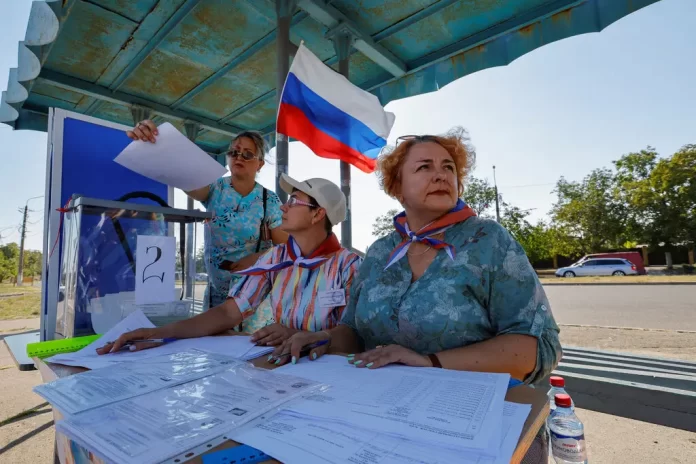The elections organised by the Russian authorities in the Ukrainian regions will be held this weekend.
Voting for Russian-established legislative bodies in the Donetsk, Luhansk, Kherson and Zaporizhzhia regions has already begun and will end on Sunday. Kyiv and the West consider the voting illegal and condemn it.
“It constitutes a flagrant violation of international law, which Russia continues to disregard.”
Kyiv supported the opinion of the Council of Europe expressed this week. The parliament said that voting in areas where Russia was “conducting active hostilities” posed a threat to the lives of Ukrainians. Ukrainian officials called on other countries not to recognise the results of the vote, which the Foreign Ministry called “fake elections.”
Political analyst Abbas Gallyamov, who worked as a speechwriter for Russian President Vladimir Putin when Putin served as prime minister, claimed that it was important for Russia to continue voting in order to maintain the illusion, despite incomplete control over the territories where voting was taking place.
“The Russian authorities are trying hard to pretend that everything is going according to plan, everything is fine.”
The voting coincides with other local elections in Russia. In the new regions, early voting started last week. Election commission officers went door-to-door and set up temporary polling stations in public places to attract passers-by.
United Russia, the main contender in the elections, is a party loyal to Putin. It has dominated Russian politics for many years, although other parties, such as the Communist Party and the nationalist Liberal Democratic Party, are also in the running.
For residents of Donetsk and Luhansk regions, which have been almost completely controlled by Russia since 2014, elections seem to be a common occurrence.
“For the last nine years, we’ve been striving to get closer with Russia, and Russian politicians are well-known to us.”
Residents of the Kherson and Zaporizhzhia regions see the elections differently. Locals and Ukrainian activists say election officials are escorted by armed soldiers and most of the candidates are unknown. Half of the elected officials reportedly come from Russia, including Siberia and the Far East.
“In most cases, we don’t know these Russian candidates, and we’re not even trying to figure it out.”
Konstantin, a resident of the Russian part of the Kherson region, said in a telephone interview that billboards advertising Russian political parties appeared along the highway, and campaign workers were brought in on special buses ahead of the vote.
“Locals understand that these elections don’t influence anything and are held for Russian propaganda purposes.”
The main purpose of referendums is to create the appearance of democracy. Ukraine and the West have declared them illegal.
Moscow has maintained control of about 70% of the Kherson region. Three other regions are also only partially captured, and Kyiv forces managed to recapture some of the land during the summer counter-offensive.
In some territories of the Zaporizhzhia region where counter offensive actions are concentrated the Russian authorities declared Friday a day off.
According to the statements of the governor appointed by Russia, Yevgeny Balitsky, 13 frontline cities and villages of the region are regularly shelled. However, the official hopes that, despite the difficulties, the United Russia party “will get the result it deserves.”
Ivan Fedorov, the Ukrainian mayor of the Russian-controlled Melitopol, Zaporizhzhia, told the Associated Press that the locals were actually being forced to vote.
“When there’s an armed person standing in front of you, it’s hard to say no.”
The mayor said that four different parties were participating in the vote, but only one was presented on billboards – the United Russia.
“It looks like the Russian authorities know the result [of the election] already. People are intimidated and scared, because everyone understands that an election in an occupied city is like voting in prison.”
According to the Eastern Human Rights Group, which monitors the voting process, the Russian authorities are trying to ensure that up to 80% of the population participate in early voting.
Both those who have received Russian citizenship and those who still have Ukrainian passports can vote. Those who refuse to vote were detained for three to four hours, the coordinator of the group Pavlo Lysianskyi said.
The authorities force them to “write an explanatory note, which subsequently becomes the basis for initiating a criminal case against the person.”
Lysianskyi’s group counted at least 104 people detained for refusing to vote.
Russian analyst Gallyamov concluded that in terms of increasing legitimacy and the level of trust among the population, the Russian authorities would not receive “any good.”
